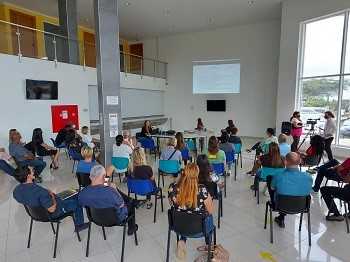The National Action Plan Committee met with animal care foundations and other private entities dealing with the stray dog issue in Aruba.
Participants were given the opportunity to ask questions about the Dog Control Center (CCC) and the Dog Control Unit (DCU). Mrs. Irene Croes, veterinarian and chairman of the action committee gave a presentation of the National Plan.
The National Plan consists of three phases and the Dog Control Unit (DCU) has completed the direct action phase. Both the DCU and the CCC are part of the Platform Dog Ordinance (PLdC). First a location had to be created for the dogs to be placed in custody as indicated in the PLdC, which serves to keep the dogs off the street. According to the PLdC, the use of dog catchers as an aid to help reduce stray dogs is required. So far, some elements in the first phase of the PLdC include, for example, the mandatory registration of all dogs, the establishment of rules for breeders and a proposal to make dog sterilization mandatory.
While sterilization of all pets is a great incentive, it has failed in the past due to lack of implementation. At the end of 2017, no funds were available for the implementation of mass sterilization. In 2019, an advisory committee, and later an action committee, filed a petition for large foundations receiving international funding to take care of this. During the meeting they petitioned to find donations for “Fundacion Stimami, Sterilisami” so that they can continue with their program. The chairman of the Stimami Sterilisami Foundation indicated that he needed approximately 1 million florins to sterilize pets. The government has no money for this in the current situation. The limited resources available for the implementation of the National Plan are used to deal with irresponsible owners. Since August 2019 they have started educational programs in schools about the dog law. They also have a Facebook page “Stima Mi Mascota” to raise awareness and educate the community on this topic. The old policy of not giving unwanted pets even an hour to be rescued remains in the past. Now the strays are being held for days as per the dog law, waiting to find a new owner, with the help of promotion on their social media page Stima Mi Mascota. In addition, the CCC guides the owners in handing over their pets at the location. It is important to establish very good communication and cooperation between all entities, foundations and government departments in order to implement this law successfully. According to the PLdC, all dogs must be kept on their owner’s property. Many foundations have already helped sterilize stray dogs and are willing to assist with the early stages of the DCU, but only if the dogs are not dangerous or a threat to their neighborhood. Only with the consent of the entire neighborhood can neutered dogs remain in the area, but with a visible tag to avoid being taken by the DCU. It must be clear to all foundations that unwanted dogs in the neighborhood can turn to the residents for assistance at the DCU. The foundation, which is responsible for placing these dogs in the neighborhoods, will ideally have the opportunity to find a permanent new home for these dogs.
The DCU is here to enforce the law. People are being fined and the police have been asked to publish the penalties for non-compliance. Authorities hope that dog owners will take better care of their dogs. The dog law serves not only to keep dogs on the owner’s property, but also to provide appropriate care for all dogs, as animal abuse and neglect is not permitted by law.
The capacity at the CCC is limited. Based on the government’s current financial situation, they urge the community to do its part, sterilize their pets, keep them on their property and be patient. The DCU has started and is addressing this issue step by step due to the nature of the issue. The goal is to help motivate the community to become responsible pet owners.




















